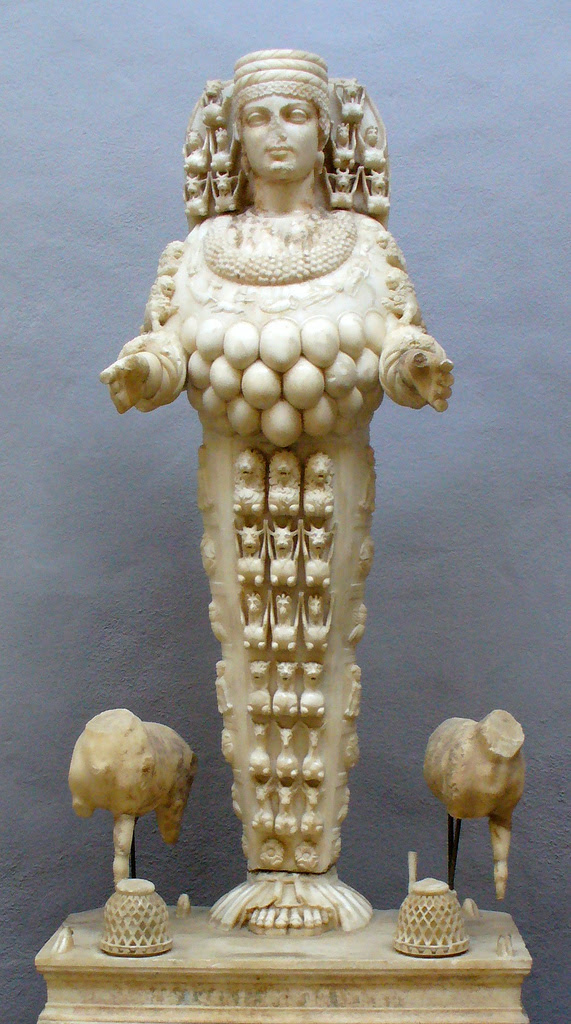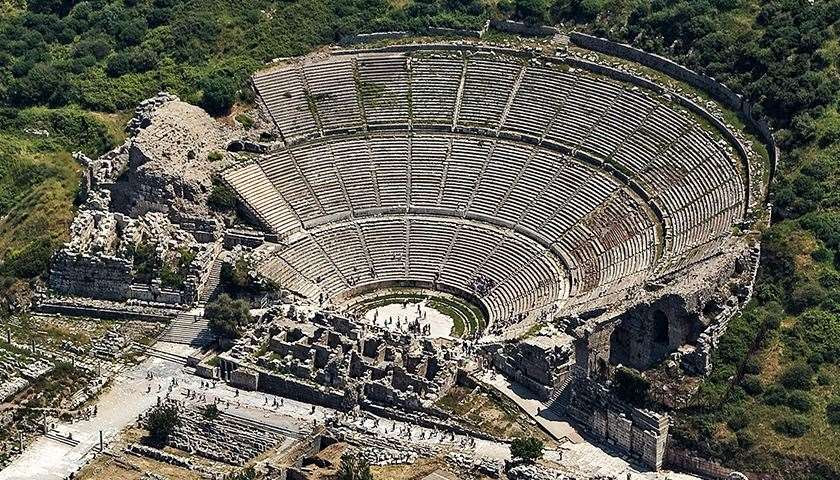| Acts 19 Ephesus, among the best preserved of archaeological sites, is a dazzling place to visit, and must have been a fine place to live. St. Paul stayed there a full two-years, holding forth daily in the lecture hall of Tyrannus during siesta hours between 11am and 4pm. This meant his hearers would have needed to be sufficiently interested in what he was proclaiming to have skipped siesta, and also that Paul and his associates (Apollos, Aquila and Priscilla are mentioned) showed considerable stamina. When the Ionians arrived in what would become Ephesus in the 10th century B.C. they found deeply established devotion to the goddess Cybele, a derivation of the Anatolian Mother Goddess whose worship dates back at least to the Hittite mother-figure Kubaba. The Ionians fused their goddess Artemis to Cybele, as the Romans would later fuse Diana to Artemis. The Temple of Artemis was the first temple on earth to have been constructed entirely of marble, and was considered one of the Seven Wonders of the World. All that may now be seen of the Great Temple is a ditch on the road between Selçuk and Ephesus, though its parameters were established in 1869 and the high altar discovered in 1965. The principal extant statue of Artemis (there were several iterations) dating from near the time of St. Paul, may be visited today at the Ephesus Museum. She, too, is constructed of beautiful marble, possibly once covered in gold, and bedecked, depending on your archaeologist, with many breasts or many bull testes; in any case, symbolizing fertility. |

| In Ephesus, St. Paul leaves off preaching in the synagogue after about 3 months, setting up in the lecture hall and perhaps signifying a more complete divergence between Judaism and Christianity. It is known that the early Christians were often derided as “atheists” because of their exclusive monotheism, which hadn’t earned any points for the Jews either, as witnessed when the Jewish leader Alexander addresses the mob in the theater at Ephesus, trying to make a distinction between Jewish religion and Pauline religion. The mob can’t see any difference, and Alexander is booed off stage. Christian preaching has provided sufficient impact in Ephesus that it is interrupting commerce and denting the sales of silver replicas of the Great Temple of Artemis. The head of the local silversmith union, Demetrius, stirs up his guild members on economic and religious grounds… “we get our wealth from this business” … “this Paul persuades a considerable number of people that gods made with hands are not gods.” A threat to trade and piety has been discovered, and that is a powerful brew. Luke has a sense of humor. Demetrius has created quite a fuss, and the city rushes to the Great Theater of Ephesus (which could hold 25,000 people), but the assembly is in complete confusion and aren’t certain why they’ve come together. Mob psychology is not a new phenomenon. It’s like a Buckeye football rally, with the chant of “Great is Artemis of the Ephesians!” going on for about two hours in unison. The crowd must have gotten tired. When the mayor addresses them with a perfectly rational argument favoring due process to swift lynching, the gathered, having missed siesta and ready for cocktail hour, quickly disperse. Paul wisely high-tails it out of town. Artemis represents the fusion of business and religion, or business and politics, or piety manipulated for pragmatic purposes. Demetrius and his union are active in every town today. A genuine Christianity resists the syncretism. Grace and peace, The Reverend Canon George F. Woodward III FOR CITIES “Heavenly Father, in your Word you have given us a vision of that holy City to which the nations of the world bring their glory: Behold and visit, we pray, the cities of the earth. Send us honest and able leaders. Enable us to eliminate poverty, prejudice, and oppression, that peace may prevail with righteousness, and justice with order, and that men and women from different cultures and with differing talents may find with one another the fulfillment of their humanity; through Jesus Christ our Lord. Amen.” The Book Of Common Prayer, page 825 Previous Reflections may be found on the parish website StPaulSMA.com under ‘Blogs’ here. YouTube postings are available here. Previous editions of THE EPISTLE can be found here. |

| St. Paul’s Anglican Church Calzada del Cardo, 6 Centro 37700, San Miguel de Allende, Mexico 415.121.3424 www.StPaulSMA.com |
